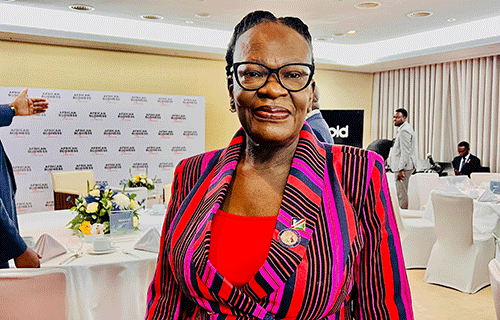LUANDA – Namibia has expressed concern over the uncertainty surrounding the renewal of the African Growth and Opportunity Act (AGOA), which allows certain African goods duty-free access to the United States market.
Minister of International Relations and Cooperation Selma Ashipala-Musavyi called for the extension of the AGOA at the US-Africa Summit, where the country recorded major diplomatic and economic victories.
She made a case for AGOA’s renewal during an interview with New Era, which showcased Namibia as a top investment destination.
“Through AGOA, we have exported charcoal to other countries. That has earned us between US$8-10 million annually,” she stated.
“Now, if we stop the market access in terms of those who are producing charcoal, where do they end?” Ashipala-Musavyi challenged.
She said the Namibian government is using the platform to discuss with the US government to avoid extending.
“We do not know what the future holds – but as far as African countries are concerned, we are united in advocating for the extension of AGOA. We are bilateral partners, but I think the US should also recognise the peculiarities and particularities of each African country. So, we are hoping that our voice will be heard and that AGOA can be extended,” Ashipala-Musavyi said.
AGOA allows duty-free access to the US market for qualifying African exports.
Its potential expiry in September this year has raised concerns across the continent.
Ashipala-Musavyi confirmed that Namibia and other African states are united in lobbying Washington for an extension.
Gains
Namibia was not just advocating but achieving. The summit marked a moment of visibility and opportunity, led by Netumbo Nandi-Ndaitwah, the only female president at the event.
Ashipala-Musavyi said Namibia has already secured meetings with multiple US companies, who are interested in sectors such as mining, agriculture and energy.
“We met several companies from the US. They are interested in mining, agriculture and energy… The companies are very excited because we have the right policy framework in place,” the minister shared the achievement.
Home
Ashipala-Musavyi said Namibia’s message to investors was a shift from being a supplier of raw materials to a country that demands value addition and local benefits.
“We are no longer interested in just extracting our mineral resources declared. We want value-added resources. We want these companies to come to Namibia and process their plants there so that we can create jobs for our people,” she stated.
She added that Namibia’s energy ambitions are bold, with plans that include banking on nuclear power.
“We are the top producer of uranium… and there’s no reason for our people to be living in darkness in urban areas,” she said.
The minister highlighted other key sectors, agribusiness, tourism and transport.
In particular, she emphasised Namibia’s role in continental logistics under the African Continental Free Trade Area (AfCFTA).
“Within the AfCFTA, we are very critical of intra-African transportation of goods and services,” she said.
Diplomatic
Namibia’s engagement was not limited to the US.
Delegates held talks with at least one African country to explore joint marketing of goods and services.
“We have almost the same natural resources. So, let’s harness our collective strengths,” Ashipala-Musavyi said.
“We talk Namibia, but we mean the African continent,” she remarked.
This reflects Namibia’s broader diplomatic approach – strategic self-interest, but within a Pan-African framework.
“At the end of the day, no one African country can do it alone. We have to come together,” Ashipala-Musavyi noted.
Unique
Throughout the summit, Namibia positioned itself as a stable, policy-driven and opportunity-rich country.
The minister said Namibia’s story is unique and must be heard globally.
“What we are hoping to get… is to have tangible outcomes, to get more investors to come to Namibia, to get more market access and to tell our story because it’s a unique story,” she stated.



